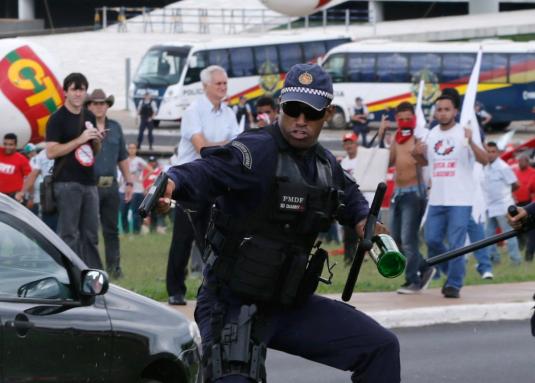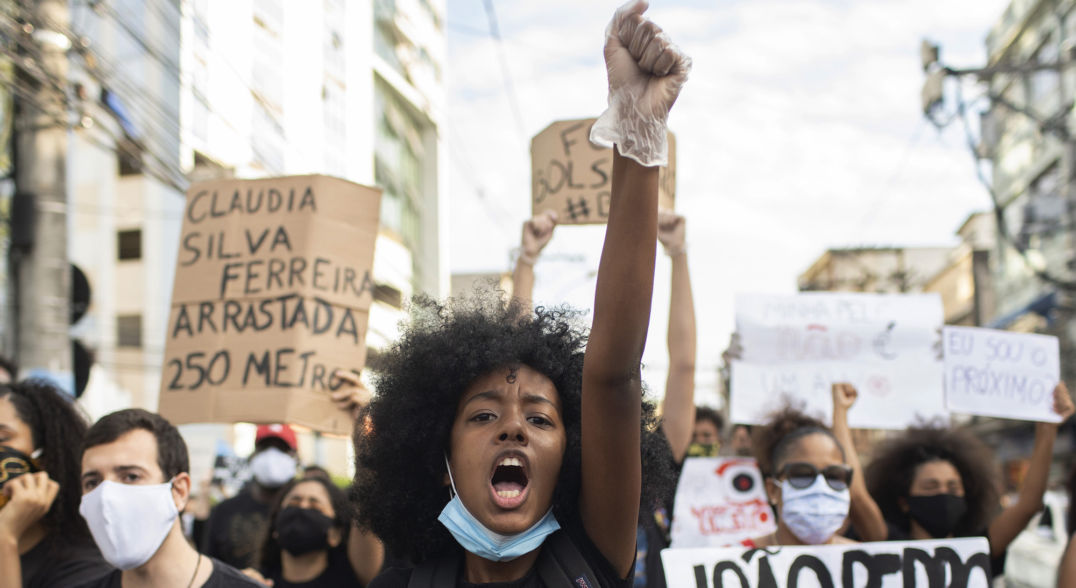RIO DE JANEIRO, BRAZIL – Racism and discrimination against black, indigenous, women, farmers, homeless and favela residents. Slave-like labor and human trafficking. Prisoners, migrants and LGBTs at risk. Insecurity, organized crime, militias, factions and a recurrent violent response by the government. Impunity and attacks on freedom of expression and the press.
These and other issues are explored in over 200 pages of a harsh report recently sent to the Brazilian government by the Inter-American Commission on Human Rights (IACHR) of the Organization of American States, the main multilateral body dedicated to the subject across the continent.
Prepared with “the goal of assessing the main challenges to human rights in the country,” the document records hundreds of failures by the Brazilian nation, whether by “omission, inefficiency or direct government action” – such as confirmed instances of deaths and impunity linked to police violence nationwide.

In 2019 alone, 6,357 people were killed by police officers in Brazil – the highest level since the Brazilian Public Safety Forum’s surveys began in 2013. By way of comparison, police lethality was 5 times higher in Brazil than in the US that same year.
In one of the most compelling sections of the text, the Commission points to the existence of a “structured system of violence and execution of ‘unwanted’ people in Brazilian society” through a combination of police violence and impunity, which would be “protected by the legal system.”
The content of the report is particularly emphatic in relation to racism, discrimination and gender violence in Brazil, described as drivers of a historical and perverse cycle of inequality, poverty and crime.
The text, on the other hand, “recognizes that Brazil has a rule of law based on solid democratic institutions.” “However,” the text continues, “recently, this system has been faced with challenges and setbacks.”
Access to firearms criticized
An arm of the OAS in charge of overseeing the guarantee of human rights across the continent, the IACHR was founded in 1959 and is based in Washington, USA. Among different duties, it presents violations cases to the OAS’ Inter-American Court of Human Rights, and takes action before the court in cases concerning crimes committed by States.
Without mentioning President Jair Bolsonaro by name, the text stresses that the easing of access to firearms promoted by the current government will be ineffective in containing or reducing violence.
Instead, according to the body, the gun policy is likely to increase crime, as well as “undermine citizens’ trust in the State and deepen historic fissures in the social fabric.”
“The Commission views with extreme concern the State’s attempts to expand, through presidential decrees, Brazilians’ access to firearms, which could also exponentially increase violence against women,” says the organization.
In the report, the organization also expresses “concern” regarding the Bolsonarist approach to the military dictatorship and torture, condemning the “denial of this historical past by the Brazilian State” and the impunity of “most of the crimes” committed during the period.
The body also criticizes measures taken by the Bolsonaro government such as the extinction of the Ministry of Labor (“which could undermine efforts to eradicate slave-like labor and child labor”) and the end of policies related to housing, society’s participation in public policies, and agrarian reform, among others.
Public data from the commission show that from Bolsonaro’s inauguration until late last year, Brazil had been the target of more than 45 public criticism cases, petitions and recommendations, in addition to the special report being finalized.
Despite harsh clashes with previous administrations (Dilma Rousseff even announced her withdrawal from the commission after criticism of the Belo Monte dam), never in the history of the IACHR has Brazil been the subject of so many complaints.
Report Preparation
However, the assessment made in the report extends far beyond the current government and provides an X-ray of Brazil that had not been seen since 1995, the date of the IACHR’s first official visit to the country to prepare a similar report.
Published this Friday, March 5th, by the OAS body, the text is the result of more than two years of work that officially began in November 2018, during an official visit by officials and members of the Commission to eight Brazilian states, as well as the Federal District.
On the official trip, the IACHR representatives met with ministers, Supreme Court justices, members of the Attorney General’s Office, Prosecutors’ Offices and Public Defender’s Offices, as well as ordinary citizens, civil society organizations and social movements.
“The Commission also collected hundreds of testimonies from victims of human rights violations and their families, and analyzed thousands of documents, laws, bills and other information,” according to official records.
Activities included visits to federal prisons, to the region known as “cracolândia” in São Paulo, to indigenous and quilombola communities, and to neighborhoods in the outskirts of cities in many states and Brasília.
After gathering a range of references to events and documents following the visit, the special work of the Inter-American Commission on Brazil was completed in December 2020, after receiving final comments and information from the Brazilian government.
Both the visit and the report were prepared at the invitation of the government of Brazil in November 2017, under President Michel Temer.

Discrimination in police and courts
The report criticizes the performance of police officers in operations involving blacks, women and minorities by mentioning disproportionate rates of violence against these groups.
“The IACHR notes that the country has had great difficulty in ensuring the right to citizen security to a broad contingent of its population,” the text says.
“People of African descent, particularly young males and people from poor family backgrounds, figure as preponderant victims of acts of intentional lethal violence, a large part of which are committed in the context of police action.”
In the Commission’s opinion, “there is a high rate of impunity for these crimes, which, in the intersection with structural discrimination, solidify a diagnosis of institutional racism” in the country.
The text points out that the “Brazilian police force is one of the most lethal in the world, as well as the one with the most professionals murdered,” and points to a damaging process “of militarization of public security, which, in turn, ultimately consolidates a logic of war in urban and rural centers.”
The Inter-American Commission on Human Rights goes further and stresses the role of justice in this process.
“Such inequality is reproduced or even amplified by the actions of the criminal justice system: on the one hand, impunity for crimes committed against these most vulnerable populations is chronic; and, on the other, the impact of the repressive State apparatus against these same populations is disproportionate.”
According to the organization, “by going unpunished, such violations committed by public security agents acquire a structural, systematic and generalized feature throughout the country.”
The IACHR further notes that not only cases of massacres involving security agents, but also cases of people involved in the recruitment and use of slave labor in Brazil also go unpunished.
“In the Commission’s opinion, such a feature (police violence) could signal the existence of a structured system of violence and execution of ‘unwanted’ people in Brazilian society, which would rely on the protection of the justice system.”
The text points out that this context suggests “a process of ‘social cleansing’ aimed at exterminating sectors considered ‘undesirable,’ ‘marginal,’ ‘dangerous,’ or ‘potentially delinquent,’ which benefits from the State’ acquiescence.”
Militias
The Commission points out that in 2019 alone, Brazil officially registered 1,254 incidents involving land conflicts across the country, an increase of 47% since 2010.
The organization lists instances of violence entailing gunfire and arson involving “public security forces and private security guards known as ‘jagunços.'”
The Commission also says that it “received with concern the information that the State would be promoting the legalization of militias and, in a way, arming them in rural territories, as well as facilitating the implementation of the military forces’ defense of lawfulness in actions aimed at the reintegration of possession.”
The organization highlights that in 2017, Brazil became “the country with the highest number of murders of environmental activists in the world.”
“(The Commission) reiterates its repudiation and concern with the execution-style murder of city councilor Marielle Franco, which is currently still under investigation at the state level.”
Regarding the well-known urban militias, involved in the city councilor’s murder, according to the Rio de Janeiro Prosecutor’s Office, the text cites “the State’s difficulty in offering solid, systemic and sustainable solutions to violence and insecurity over the past 23 years, by articulating the different levels of the federation and the different police forces around measures that combine prevention and repression.”
“(This) created a fertile ground for the emergence and expansion of criminal organizations, such as the so-called militias,” the commission says.
Women and LGBTs
Quoting a set of data on feminicides, with a greater prevalence among black women, the commission reports that it has received a number of complaints about a worsening in levels of violence against women.
The organization recalls that “the mere acknowledgement of violence against women as a public issue, and not as a private relationship issue, took decades to materialize in the country.”
The text calls for the government and Brazilian society to fight diligently against the “rape culture” in the country.
“The Commission reiterates its recommendations on the importance of promoting laws and public policies that seek, through human rights education, to address and eradicate structural prejudices, historical discrimination, as well as stereotypes and false concepts about women.”
Also according to the report, “the gender condition has been shown to be an aggravating factor in the experiences of inequality and discrimination” in the “structural processes of human rights violations in the country.”
“Machismo and misogyny continue to relegate women to a secondary position in the economy and in public affairs, with obvious wage differences in the labor market and underrepresentation in legislatures and councils, particularly in high-ranking positions.”
The organization also notes a “regression trend in the protection and promotion of LGBTI people’s rights in the country,” as well as “an increase in the use of rhetoric that instigates hatred and that tends to increase the rates of attacks against people of different sexual orientations and gender identities.”
In yet another reference to Bolsonarism, citing the performance of “one of Brazil’s presidential candidates” in October 2017, the document recalls the controversy surrounding an educational primer on diversity created to tackle bullying in schools that came to be pejoratively known as the “gay kit.”
“The untruth of the news about the ‘gay kit’ was confirmed by a Superior Electoral Court (TSE) ruling, which requested the suspension of links from websites and social networks related to the term,” reads the text.
The report also recognizes “important progress” such as the guarantee of homosexuals’ right to marry, and transgenders to use their social name, as well as the expansion of LGBTI people’s participation and candidacy in elections.
The agency sounds an alert.
“Brazil continues to register very high rates of violence against LGBTI people, particularly lesbians and transgender women; and that, as a rhetoric of ‘defense of the family’ and traditions gains traction within society, several rights of these people are under threat.”
The report concludes with a number of recommendations “to strengthen a system for the promotion and protection of human rights, in accordance with the commitments made by the State in the Inter-American and international spheres.”
Source: BBC Brasil

